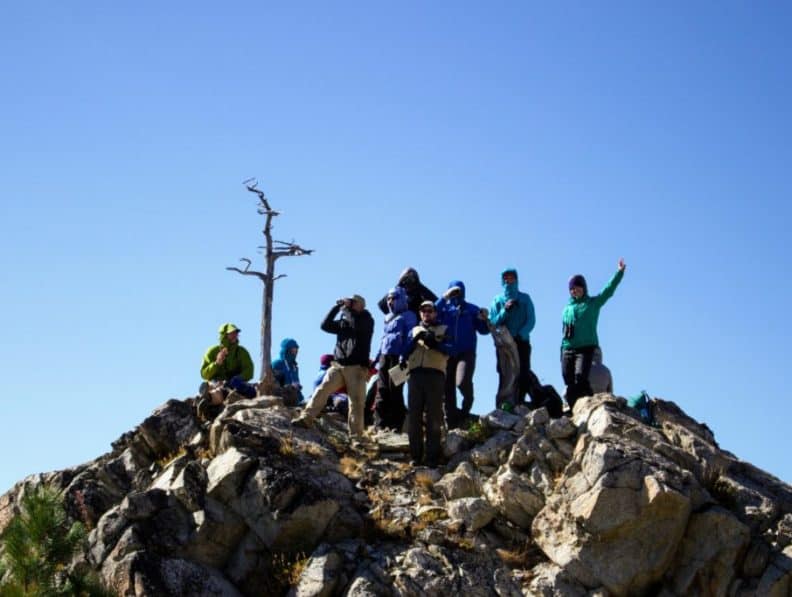
Welcome New Graduate Students, part 2
This is part two of graduate student introductions. You can find part one here.
The goal of this series is to welcome the Class of 2019, and learn more about why they chose the Master of Education degree program through the North Cascades Institute. Below are the reasons folks are here, and what they hope to take away from a year-long residency. They have also shared their most memorable experiences so far. Stay tuned for the final installment!
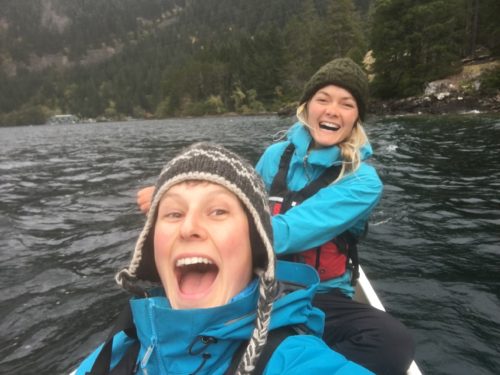
Charlee and Zoe Wadkins paddling the Skagit River
Charlee Corra:
I feel most connected to learning when I can do it outside in an experiential setting. So I looked for an opportunity to join a learning community with people committed to becoming effective educators. I also wanted first-hand teaching experience through Mountain School. The North Cascades Institute offers a rich and immersive program emphasizing place-based learning, nonprofit skill development, and Pacific Northwest natural history. To top it all off, who wouldn’t want to do a year-long residency in the breathtaking North Cascades National Park?
The obvious answer to what I hope to gain during my time at the North Cascades Environmental Learning Center is to develop my skills as an environmental educator. But on a deeper level, I am here to learn about who I am and to uncover the most meaningful way for me to give back and serve the larger community, especially through an environmental and social justice lens.
The most memorable experience so far was on the last day of the 10-day backpacking trip. We were hiking up to Cascade Pass, passing the headwaters of the Stehekin River, when I turned around and looked back from where we had come. I looked down at the entire Stehekin Valley filled with wispy clouds, bright red and orange fall colors, and the memories of our challenging, but extremely satisfying, journey through an entire watershed. It all came flooding back.
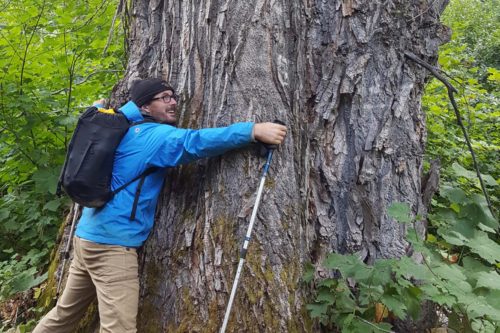
Brendan hugging a massive cottonwood tree below Cascade Pass
Brendan McGarry:
I’ve always been exceptionally passionate about the natural world. As a youngster I wanted to study science, and indeed I have carried out that vision through my undergraduate years and beyond. Yet I always found myself wanting for something else. After seeing the value of environmental education through various jobs, I realized that I want to help connect people with natural world. Through those connections we foster stewardship. I am here at the Learning Center to learn how to become a better educator, and effective leader in a non-profit setting.
I also want to gain a deeper connection and understanding of a place. I look forward to gaining more knowledge about the natural history of the North Cascades and the greater region, which I have called home most of my life. The opportunity to immerse myself in this unique setting is certainly special. I hope to take full advantage by spending a lot of my time in nature. I also hope to come away with ideas about how places like the Learning Center are run, and to get a lot of hands on experience facilitating experiences in an outdoor setting.
Although I’ve had opportunities to backpack in the Cascades throughout my life, having the time to not only backpack ten days, but do it through a course, was incredible. My hiking group spent 3 nights at Hidden Meadows near McCalister Pass and our time there was spectacularly peaceful and intellectually fruitful. I felt like I came to know the North Cascades better after our time walking through them.
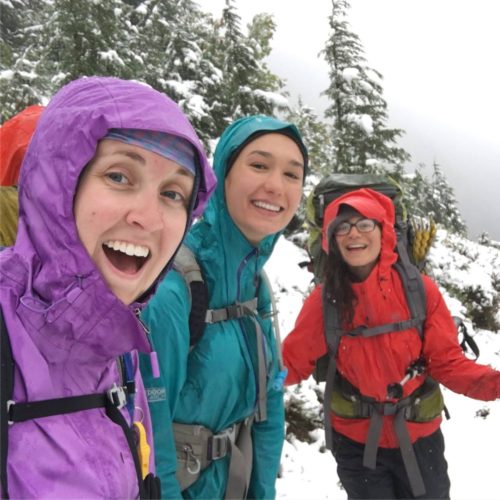
Ashley posing with Liz Grewal and Montana Napier in a September winter wonderland
Ashley Hill:
I graduated from Western Washington University in 2012 with a bachelor degree in Environmental Science, with an emphasis in marine ecology. As I searched for graduate programs, I looked for something that incorporated the development of professional skills for educators and experiential learning. I also wanted a program that allowed for genuine connection and networking in the community. I am thrilled to have found this Graduate M.Ed. program. I am even more excited about the inclusion of a residency. During my undergrad, I participated in Residence Life, and I found that this genuinely enhanced my experience of college.
The course work in nonprofit administration, natural history, and place based learning also drew me to this program. I had fallen into education in my previous job and I wanted to develop skills to be a more effective environmental educator. This program is the perfect fit for all my future endeavors. While at the Learning Center, I look forward to gaining more professional experience through work study opportunities and personal connections with my cohort and the greater community. The North Cascades are such a special place for all the folks who come to visit and the people who live here. I love digging into the details of organizational operations like budgeting and strategic planning along with connecting to the people I’m with!
I am also excited to explore this place and become familiar with the landscape and story. The opportunities are seemingly endless for hiking, backpacking, and (eventually) snow sports! Backpacking over Cascade Pass was incredible. As our group ascended towards Cascade Pass, and we started to encounter snow…and then be completely immersed in snow! We supported each other through a phenomenally rewarding moment. I truly enjoy getting to know our cohort, and those challenging experiences have been the most special moments of our time so far!
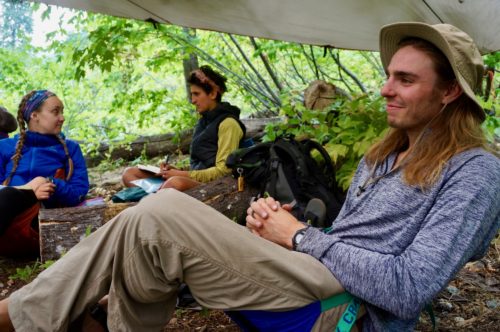
Nate hanging out at Cottonwood Camp. Photo by Rachael Grasso.
Nate Trachte:
The Graduate M.Ed. Residency with North Cascades Institute attracted me because of its mission to develop leaders and effective citizens of happy and healthy communities. This program provides graduate students the opportunity to learn and grow in a beautiful setting amongst caring, kind, and welcoming people. This was a chance I was not going to miss!
I’m hoping that during my residency I am able to emerge as an educator and a leader. Throughout this program I want to grow as a person so that I can facilitate meaningful experiential education for others. Getting to know the greater community involved with North Cascades Institute has been incredible. This region is packed with dedicated citizens, and I am thrilled to call this place home.
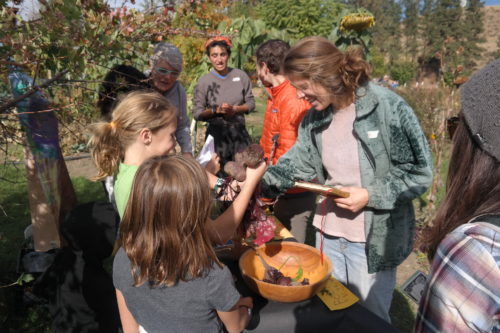
Kira buying vegetables at the student-led farmer’s market through Classroom in Bloom
Kira Taylor-Hoar:
I knew that I wanted to live in the Pacific Northwest for the past ten years or so, and I wanted an excuse to live out here. I also wanted to work in educating youth about the state of our world, and get them in touch with nature. And I wanted to spend as much time outside as possible. So, I googled outdoor education graduate programs in the Pacific Northwest, and that brought me here.
I’m hoping to get experience teaching kiddos and adults in an outdoor setting. I am also excited to learn about nonprofit administration and the community building aspects that come with living and working around the Environmental Learning Center. I look forward to making lasting connections with a bunch of people who are pretty darn great.
One of the most memorable experiences was the last day of our backpack, when we hiked over Cascade Pass. It snowed lightly as we reached the beginning of the Pass, making the world look like an evergreen, winter-wonderland in September. We kept walking and came upon ripe huckleberries in the snow. We proceeded to eat them bear-style with just our mouths (aka no hands). This must have sent out a calling card to the universe because not 100 yards up the trail we came across a big black bear right off the trail, mowing down on berries. Another half mile and our group came across yet another black bear, while the snow fell with greater gusto. By the time we reached the Pass it was up to our calves. Several miles and 35 switchbacks later we arrived at the vehicles, and I wished I would’ve stayed out there another 10 days.

